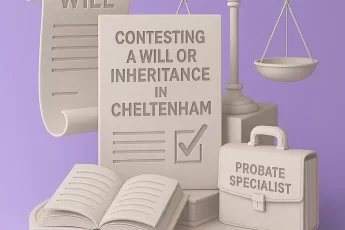 Renting out or occupying a property can be a straightforward arrangement when both parties understand their rights and obligations. Yet disputes between landlords and tenants remain one of the most common causes of legal tension in residential and commercial lettings. Whether it’s unpaid rent, disrepair, or disagreements over notice periods, these conflicts can quickly escalate without clear communication or proper legal guidance.
Renting out or occupying a property can be a straightforward arrangement when both parties understand their rights and obligations. Yet disputes between landlords and tenants remain one of the most common causes of legal tension in residential and commercial lettings. Whether it’s unpaid rent, disrepair, or disagreements over notice periods, these conflicts can quickly escalate without clear communication or proper legal guidance.
At Midwinters, our Cheltenham-based solicitors specialise in resolving landlord and tenant disputes efficiently, ensuring both sides reach a fair and lawful outcome.
Understanding the Most Common Landlord–Tenant Disputes
Landlord and tenant disputes can arise for a wide range of reasons, but many fall under a few familiar categories:
- Non-payment of rent
Missed or delayed rent payments are one of the leading triggers for legal action. Landlords are entitled to expect rent on time, but there may be underlying causes such as financial hardship or property defects that justify negotiation before proceeding to eviction. - Disrepair and maintenance
Tenants have a right to live in a property that is safe and well maintained. If a landlord fails to repair heating, plumbing, or structural issues, a tenant may have grounds for compensation or to carry out repairs and deduct the cost from rent (known as self-help remedies). Conversely, landlords can challenge unreasonable claims where damage is due to tenant negligence. - Deposit disputes
When a tenancy ends, disagreements often arise about deposit deductions. Tenancy Deposit Protection (TDP) schemes provide an impartial process for resolving such disputes, but legal advice is often useful where the claim involves substantial damage or unpaid rent. - Breach of tenancy agreement
If either party breaches their contractual obligations—whether through unauthorised subletting, antisocial behaviour, or failure to provide access for inspections—formal notices and legal action may follow. - Ending a tenancy or regaining possession
Navigating the process of eviction can be complex. Landlords must use the correct notice procedure (such as a Section 8 or Section 21 notice) and comply with strict rules regarding timing, documentation, and tenant protection. Mistakes can delay possession and lead to costly disputes.
The Legal Framework for Landlord and Tenant Disputes in England
Landlord and tenant relationships are governed by a combination of statute and contract law. In England, the Housing Act 1988 remains the cornerstone of residential tenancies, defining how and when landlords may regain possession. For commercial tenancies, the Landlord and Tenant Act 1954 provides similar protection, preventing tenants from losing their business premises without due process.
In Cheltenham, as elsewhere, landlords must also comply with secondary legislation such as the Tenant Fees Act 2019, gas and electrical safety regulations, and the Homes (Fitness for Human Habitation) Act 2018. Failing to follow these laws can make a landlord’s position unenforceable in court.
For tenants, understanding these frameworks helps ensure their rights are respected while fulfilling their own legal duties.
How to Resolve a Landlord–Tenant Dispute
When a disagreement arises, it’s best to act promptly and objectively. The right approach depends on the type and seriousness of the issue, but the following steps are generally effective.
Step 1: Open communication
Many disputes stem from misunderstandings or unmet expectations. A direct, written discussion can often resolve problems before legal costs escalate. Both parties should keep records of all correspondence and any agreed actions.
Step 2: Review the tenancy agreement
This document is the foundation of the relationship. It outlines each party’s rights, responsibilities, and notice periods. Solicitors can interpret ambiguous clauses or identify breaches that may not be immediately apparent.
Step 3: Consider mediation
Mediation offers a cost-effective, non-adversarial route to settlement. A neutral mediator helps both sides reach a compromise without the need for court proceedings. Midwinters’ dispute resolution team regularly supports clients through mediation, which is particularly useful for preserving ongoing relationships between landlords and tenants.
Step 4: Formal legal notices
If informal negotiation fails, landlords may need to serve a Section 8 or Section 21 notice.
– Section 8 applies where the tenant has breached the tenancy agreement—for example, by falling into rent arrears or damaging the property.
– Section 21 allows landlords to regain possession at the end of a fixed-term tenancy without giving a specific reason, though its use is subject to strict procedural requirements.
Tenants can challenge a notice that has been incorrectly drafted or served in breach of regulations, such as where the deposit has not been properly protected.
Step 5: Court proceedings
If the tenant does not leave after notice expires, the landlord can apply to the court for a possession order. Similarly, tenants may bring a claim for disrepair or unlawful eviction. While court action should always be a last resort, professional representation can make a significant difference to the outcome and costs.
—
Why Early Legal Advice Matters
Many disputes become entrenched because the parties seek advice too late. Early intervention by a specialist landlord and tenant solicitor can:
– Identify the most effective legal route for recovery or defence.
– Prevent procedural errors (such as invalid notices).
– Reduce the emotional and financial toll of prolonged disputes.
– Encourage negotiated or mediated settlements before trial.
At Midwinters, we combine clear, practical advice with a detailed understanding of the local property market in Cheltenham and Gloucestershire. In addition we are based near the local court that hears all Landlord and Tenant cases in Gloucestershire. Our approach is both strategic and pragmatic—protecting your interests while promoting a fair and lawful resolution, as well as knowing the local court system intimately.
Common Questions About Landlord and Tenant Disputes
**Do I need a solicitor to evict a tenant?**
While it’s legally possible to serve notice without representation, professional advice ensures compliance with the correct process. Errors can lead to delays or claims for unlawful eviction.
**Can a tenant withhold rent for disrepair?**
This is only lawful under limited circumstances and after proper notice has been given. Withholding rent without legal justification can breach the tenancy and risk eviction.
**How long does the eviction process take?**
It depends on the notice type, court backlogs, and tenant response. In straightforward cases, possession may be granted within a few months, but complex disputes can take longer.
Landlord and Tenant Disputes in Cheltenham: Local Considerations
Cheltenham’s rental market is diverse, spanning student accommodation, period homes, and commercial premises. Local letting trends—such as short-term lets during race week or academic tenancies—can complicate contractual terms.
Midwinters’ property team has deep experience in this regional context, representing landlords, numerous letting and property agents across Gloucestershire. Whether you’re dealing with a tenant in arrears or a lease renewal disagreement, our solicitors provide tailored, cost-effective solutions grounded in local expertise.
Click here to read more





